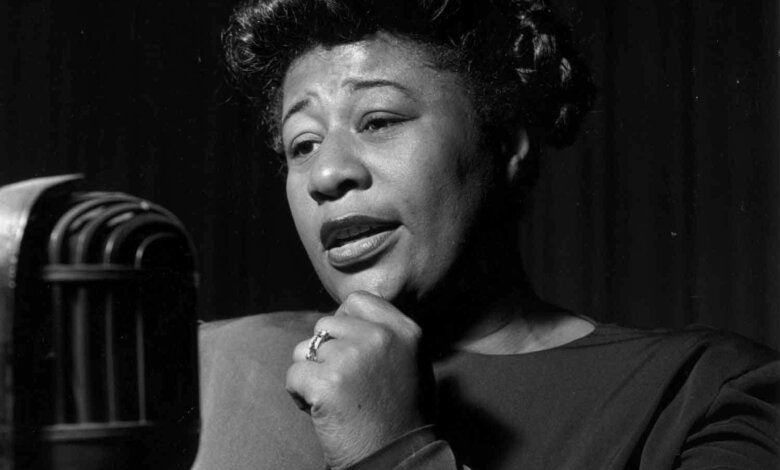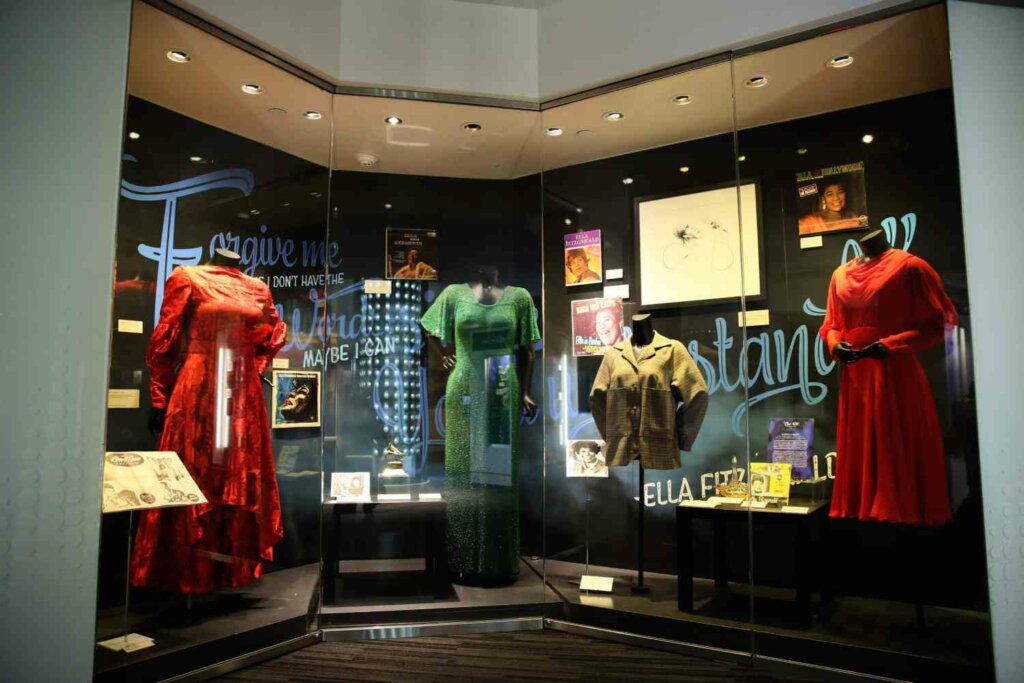Remembering Ella Fitzgerald, the first Black artist to win a Grammy

From her first appearance at the Apollo in 1934 to her first GRAMMY wins for 1958 to her memorable final concert at New York’s Carnegie Hall in 1991, the American jazz singer’s career spanned more than 200 recorded albums and thousands of concert performances.
Ella Jane Fitzgerald was born April 25, 1917, in Newport News, Virginia, U.S., to William Fitzgerald and Temperance ‘Tempie’ Henry. She was often called First Lady of Song, the Queen of Jazz, and Lady Ella, because her scat singing was noted for its purity of tone, excellent pronunciation, phrasing, timing, and intonation.
In homage to her lasting legacy, the GRAMMY Museum hosted Ella At 100: Celebrating The Artistry Of Ella Fitzgerald, an exhibit that showcased rare recordings, photos, stage costumes, and other artifacts representing the extensive career of the 13-time GRAMMY winner.
The exhibit, which was displayed in the Mike Curb Gallery on the Museum’s fourth floor, opened April 25, 2017; because April 25 marks the centennial anniversary of Ella Fitzgerald’s birthday.

First prize at the Apollo
Fitzgerald’s public singing debut happened thanks to a last-minute bout of stage fright during an early Amateur Night at the Apollo Theater in 1934. Though she had sung on street corners in Harlem, N.Y., the then-17-year-old planned to perform a dance routine for her Apollo show. After seeing she would follow a strong routine by a local dance group, she momentarily froze onstage.
With the crowd reportedly murmuring, “What is she going to do?” Fitzgerald made a snap decision to sing Hoagy Carmichael’s “Judy.” As she finished, the crowd went wild and demanded an encore, which she obliged. Fitzgerald took home first prize and $25 cash that night (about $528 today when adjusted for inflation)
First breakthrough
In 1938 Fitzgerald recorded an extended and embellished version of the classic nursery rhyme “A-Tisket, A-Tasket,” which she had restructured as a jazz tune. Backed by Chick Webb And His Orchestra, the recording sold 1 million copies and became her first breakout single, marking her rise to fame. Fitzgerald’s version became her first recording inducted into the GRAMMY Hall Of Fame in 1986.
First songbook
In 1956 Fitzgerald released Ella Fitzgerald Sings The Cole Porter Songbook, which would be the first of eight songbook series she released on Verve Records. The songbook series formed the basis of the most well-known music in her discography.
This first songbook recording was inducted into the GRAMMY Hall Of Fame in 2000, which was preceded by the 1999 induction of 1957’s Ella Fitzgerald Sings The Rodgers And Hart Song Book.
First GRAMMY wins
Two of Fitzgerald’s albums, Ella Fitzgerald Sings The Duke Ellington Songbook and Ella Fitzgerald Sings The Irving Berlin Songbook, were nominated for GRAMMYs at the 1st GRAMMY Awards in 1958.
She won for both, for Best Jazz Performance, Individual (… Duke Ellington Songbook) and Best Vocal Performance, Female (… Irving Berlin Songbook). Fitzgerald simultaneously became the first African-American woman to win a GRAMMY and the first woman to win multiple GRAMMY Awards.
Read Also: A Profile on Legendary Sidney Poitier 1927-2022
First female GRAMMY performance
The first televised GRAMMY event, a taped “NBC Sunday Showcase,” in honor of the 2nd GRAMMY Awards, aired Nov. 29, 1959.
While the big winners of the evening were Frank Sinatra and Bobby Darin, it was Fitzgerald’s performance on this initial broadcast that earned her the distinction as the first woman to command the GRAMMY stage among other acts such as Van Cliburn, comedian Shelley Berman, Nat “King” Cole, Duke Ellington, the Kingston Trio, and the Mormon Tabernacle Choir.
First female Recording Academy Lifetime Achievement Award recipient
The inaugural Recording Academy Special Merit Award was given in 1963 to Bing Crosby, and thus the award was named the Bing Crosby Award.
When Fitzgerald received this award in recognition of her outstanding contributions to the recording community in 1967, she became the first woman to receive the honor, which is now known as The Recording Academy’s Lifetime Achievement Award.
First for singers, marking a lasting legacy
In 1989 Fitzgerald was the first recipient of another annual award given by the Society of Singers, a since-shuttered nonprofit founded by Ginny Mancini, Henry Mancini‘s widow, dedicated to helping singers in need.
In recognition of Fitzgerald’s career, musical achievements and ongoing charitable support, the Society of Singers henceforth named their annual award the Ella Award. She passed on June 15, 1996, at the age of 79.
Source: GRAMMY Awards
Abeeb Lekan Sodiq is a Managing Editor & Writer at theafricandream.net. He’s as well a Graphics Designer and also known as Arakunrin Lekan.





